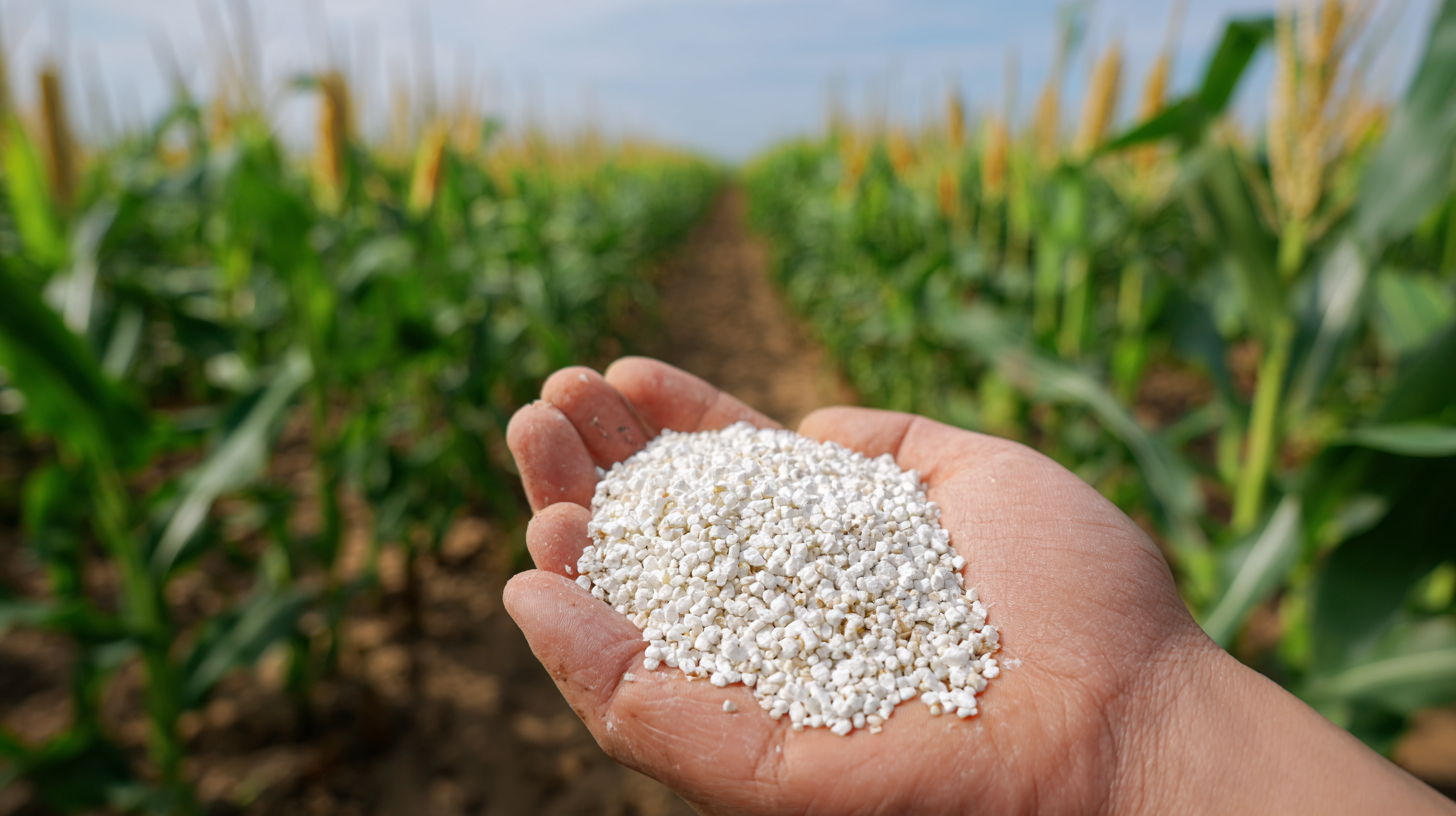 Calcium Nitrate, a critical compound in modern agriculture, plays a pivotal role in enhancing fertilizer efficiency and promoting plant growth. According to the International Fertilizer Association, the use of Calcium Nitrate can lead to a significant increase in crop yields, with studies demonstrating up to a 20% improvement in certain vegetable and fruit crops when used alongside conventional fertilizers. This compound not only supplies essential nitrogen, but also provides calcium, which is vital for cellular structure and overall plant health.
Furthermore, research from the Fertilizer Institute highlights that Calcium Nitrate's ability to improve nutrient uptake efficiency allows for reduced fertilizer application rates, thus promoting sustainable farming practices. As the agricultural sector continues to face challenges related to soil health and nutrient management, incorporating Calcium Nitrate into fertilizer programs has become indispensable for maximizing productivity and ensuring food security.
Calcium Nitrate, a critical compound in modern agriculture, plays a pivotal role in enhancing fertilizer efficiency and promoting plant growth. According to the International Fertilizer Association, the use of Calcium Nitrate can lead to a significant increase in crop yields, with studies demonstrating up to a 20% improvement in certain vegetable and fruit crops when used alongside conventional fertilizers. This compound not only supplies essential nitrogen, but also provides calcium, which is vital for cellular structure and overall plant health.
Furthermore, research from the Fertilizer Institute highlights that Calcium Nitrate's ability to improve nutrient uptake efficiency allows for reduced fertilizer application rates, thus promoting sustainable farming practices. As the agricultural sector continues to face challenges related to soil health and nutrient management, incorporating Calcium Nitrate into fertilizer programs has become indispensable for maximizing productivity and ensuring food security.
Calcium nitrate plays a pivotal role in enhancing nutrient uptake in plants, acting as a key driver of overall fertilizer efficiency. This compound not only supplies calcium, which is vital for cell wall structure and growth, but also provides nitrate, a crucial nitrogen source. Together, these elements facilitate the effective absorption of other essential nutrients like potassium and magnesium, thereby improving plant health and yield.
When applying calcium nitrate, consider these tips: Firstly, distribute the fertilizer evenly to ensure that all plants receive adequate nutrients. Secondly, combine calcium nitrate with other fertilizers that supply micronutrients for a more balanced approach. Lastly, monitor soil pH levels; calcium nitrate can help maintain an optimal pH for nutrient availability, making your fertilization efforts more effective.
By incorporating calcium nitrate into your fertilization regime, you can significantly enhance not only nutrient uptake but also the overall growth and productivity of your crops, leading to a healthier and more bountiful harvest.

Calcium nitrate is a vital nutrient that significantly enhances soil structure and health. This compound not only supplies calcium and nitrogen—two critical elements for plant growth—but also improves soil physical properties. According to a report by the International Fertilizer Association, the addition of calcium nitrate can reduce soil compaction, increase porosity, and enhance water retention. This leads to a more favorable environment for root development and microbial activity, ultimately fostering healthier plants and better crop yields.

One of the key benefits of calcium nitrate is its ability to promote soil pH balance. Research from the Soil Science Society of America highlights that calcium plays a crucial role in neutralizing acidity, which can hinder nutrient availability. By incorporating calcium nitrate into your fertilization regime, you can create a more stable and nutrient-rich environment, aiding in the overall fertility of the soil.
Tip: To maximize the benefits of calcium nitrate, consider applying it in conjunction with organic matter, such as compost. This combination helps to further improve soil structure and enhance nutrient cycling. Tip: Monitor soil moisture levels after application, as calcium nitrate can increase evaporation rates in sandy soils. Adjust your irrigation practices accordingly to prevent water stress in plants.
Calcium nitrate plays a crucial role in enhancing plant growth and yield by providing essential nutrients that support various physiological functions. This compound delivers both calcium and nitrogen, two vital elements that contribute to strong root development, improved nutrient uptake, and overall plant health. Calcium strengthens cell walls, which increases resilience against diseases and environmental stresses, while nitrogen promotes vigorous foliage and enhances the photosynthesis process, leading to better growth and higher yields.
To maximize the effectiveness of calcium nitrate in your fertilization strategy, consider the following tips: first, apply calcium nitrate during the early growth stages of your plants to ensure a solid foundation for development. Secondly, ensure that your soil pH is adequately balanced; calcium can help correct acidity levels, making nutrients more accessible. Lastly, mix calcium nitrate with other fertilizers to create a well-rounded nutrient blend, but be cautious of the timing and amounts to avoid nutrient burn.
Utilizing calcium nitrate effectively can result in healthier, more productive plants. With attention to the specific needs of your crops and proper application techniques, you can achieve significant improvements in both growth and yield. Consider incorporating this vital nutrient into your fertilization regimen for optimal results.
| Nutrient | Role in Plant Growth | Recommended Application Rate (kg/ha) | Expected Yield Increase (%) |
|---|---|---|---|
| Calcium | Strengthens cell walls, improves root development | 300 | 10-15 |
| Nitrogen | Promotes leafy growth, enhances photosynthesis | 300 | 20-25 |
| Magnesium | Vital for chlorophyll synthesis | 150 | 5-10 |
| Sulfur | Essential for protein synthesis | 100 | 5-8 |
Integrating calcium nitrate into your overall fertilizer strategy can significantly enhance nutrient uptake and plant health. Calcium nitrate not only provides vital calcium and nitrogen, but it also improves soil structure and moisture retention. By ensuring that your crops receive adequate calcium alongside nitrogen, you can promote stronger root systems and prevent common deficiencies that might hinder growth. This balanced approach helps in maximizing yield potential, especially in calcium-sensitive crops.
Tips for integrating calcium nitrate into your fertilization routine include applying it during critical growth stages. For instance, incorporating calcium nitrate during the late vegetative phase can prepare plants for fruit-set. Additionally, be cautious with application rates—too much calcium can lead to nutrient imbalances. Another effective strategy is to mix calcium nitrate with other fertilizers that your soil might require, ensuring a comprehensive nutrient profile without oversaturating any one element.
Consider using fertigation systems to deliver calcium nitrate efficiently. This method allows for precise application and reduces the risk of nutrient runoff. Regular soil testing and monitoring of plant health will guide your adjustments, ensuring that calcium nitrate remains an integral part of your fertilization strategy for optimal crop performance.
Calcium nitrate stands out as a superior choice compared to traditional fertilizers, primarily due to its unique nutrient composition. While conventional fertilizers often provide a single nutrient source, calcium nitrate delivers both calcium and nitrogen in one compound. This dual benefit not only supports healthy plant growth but also enhances nutrient uptake efficiency. The presence of calcium helps to strengthen cell walls, improving plant resilience against disease and stress, while nitrogen is crucial for promoting lush foliage and vigorous growth.
Moreover, the solubility of calcium nitrate ensures that nutrients are readily available for plant absorption, minimizing the risk of nutrient lockout that can sometimes occur with traditional fertilizers. This characteristic allows for targeted feeding, especially in hydroponic systems or during critical growth phases, leading to more effective fertilization strategies. By choosing calcium nitrate over standard fertilizers, growers can achieve better yield and improved crop quality, ultimately translating to greater economic profits and sustainability in agricultural practices.






